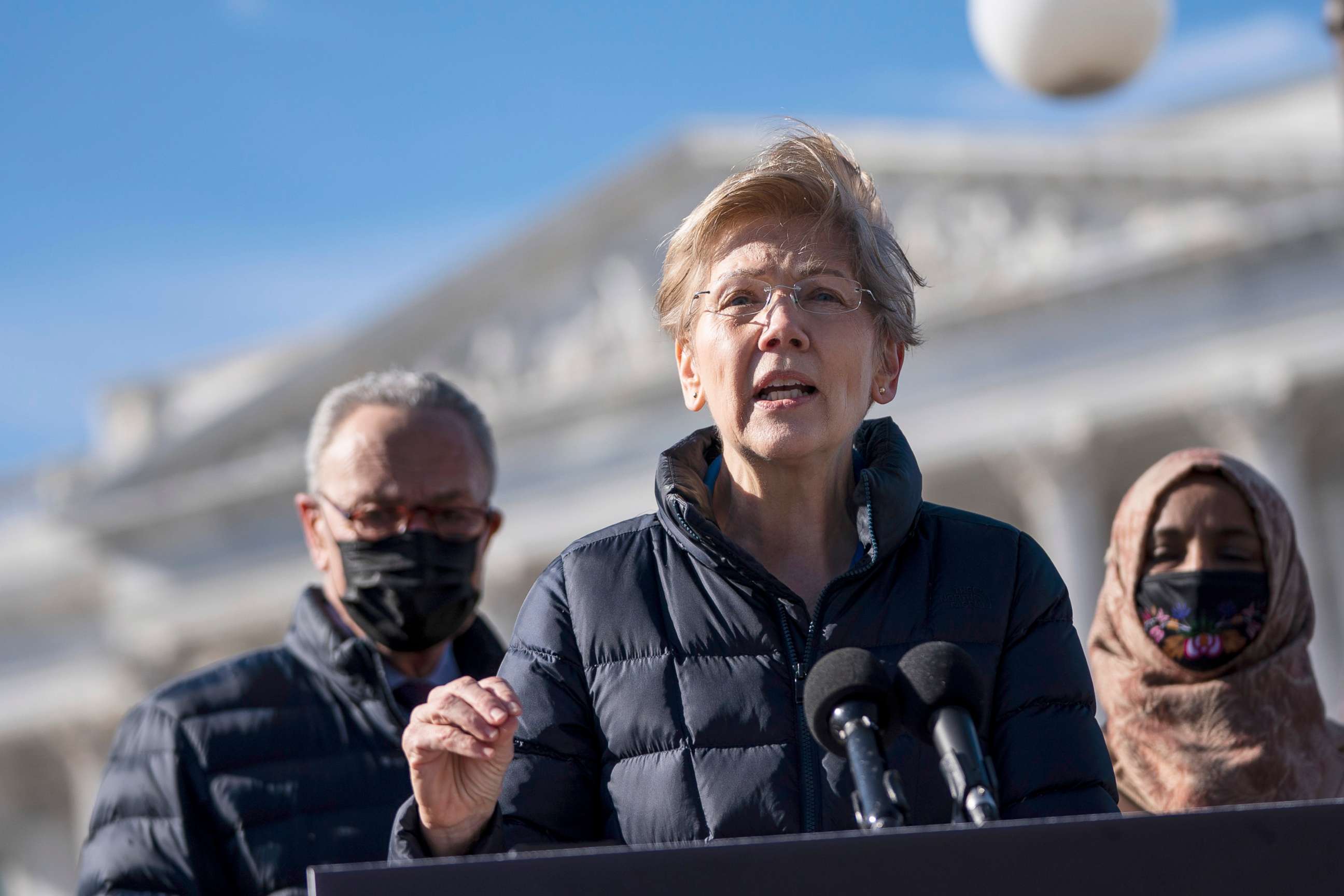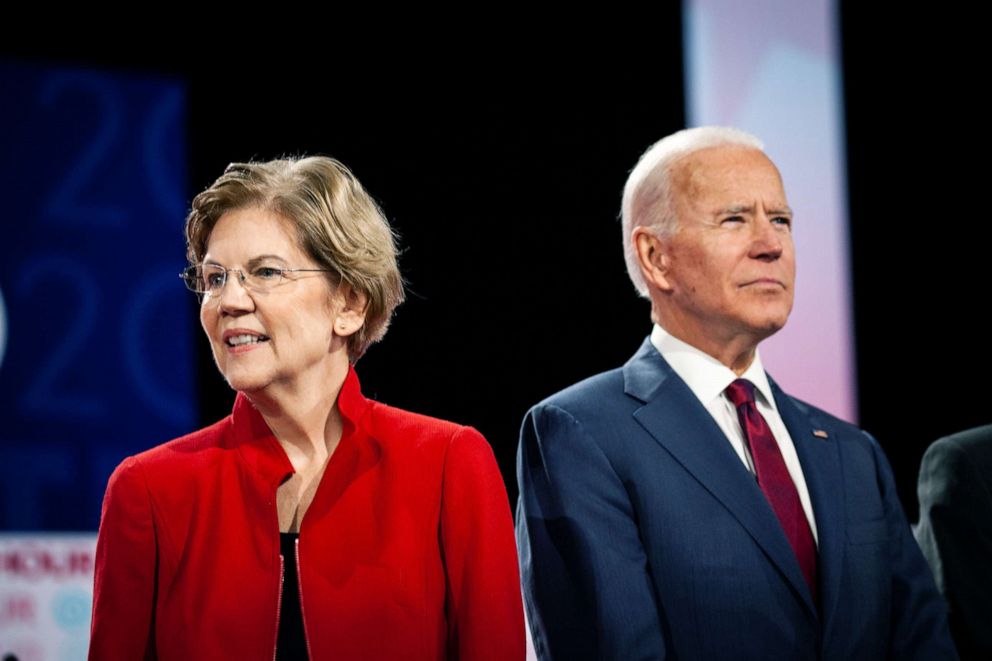Congressional Democrats propose up to $50,000 in debt cancelation, Biden not sold
The White House press secretary said Biden supports a more modest proposal.
Congressional Democrats, led by Senate Majority Leader Chuck Schumer and Sen. Elizabeth Warren, renewed calls Thursday for President Joe Biden to cancel up to $50,000 in federal student loans per individual.
Schumer and his colleagues said Thursday that canceling loans would provide a much-needed boost to the economy during the pandemic and help to lift communities of color. But the administration balked at the proposal Thursday afternoon, one of the first instances of Biden breaking with Senate Democrats since he was sworn into office.
Schumer, flanked by Warren and House Democrats, including Rep. Ilhan Omar, D-Minn., and Ayanna Pressley, D-Ohio, called for a robust response from the Biden administration, urging the president to do more on student debt relief.
"Debt holds people back from buying cars, from going on vacations, from starting families, from getting the job they want to get, it's a huge anchor on our entire economy," Schumer said. "There's very little that the president could do with a flick of a pen that would boost our economy more than canceling $50,000 of student debt."
But during a press conference Thursday, White House press secretary Jen Psaki told reporters that Biden supports a more modest proposal: up to $10,000 in student loan forgiveness per person.
Biden has taken some measured steps to assist those struggling with student loans, but he has stopped short of full debt forgiveness.
His efforts have been aimed at Americans who are unable to repay their loans due to financial challenges posed by the COVID-19 pandemic, which -- according to Mark Kantrowitz, a financial aid and student loan expert -- has slowed the rate at which people are repaying their loans.
"It's clear it had a negative impact on a lot of borrowers," Kantrowitz said of the pandemic, which has caused millions of Americans to file for unemployment. "Some borrowers are struggling."

One of Biden's earliest presidential executive orders directed the Department of Education to extend the freeze on federal student loan repayment that has been in effect since Congress passed its first massive COVID-19 relief bill in March.
The executive order gives borrowers more time to pay back loans without facing interest hikes -- but it doesn't wipe away student debt.
Biden campaigned on securing $10,000 in student debt forgiveness per person, but this was not included in the $1.9 trillion coronavirus relief crafted by the Biden administration and adapted by congressional Democrats.
Schumer and Warren's resolution, which they introduced with members of the House Democratic caucus on Thursday, calls on Biden to forgive debt by executive order, allowing action while bypassing Republican objection in the narrowly divided Congress.
"The easiest way to do it is for President Biden with the flick of pen to get it done," Schumer said.
But Psaki said that Biden will look to Congress to send a bill on debt forgiveness to his desk.
"I think he already took a step through an executive action on the first day," Psaki said, citing Biden's extension on loan forbearance. "He would look to Congress to take the next steps."
That creates a roadblock for the Democratic effort. Moving legislation through the evenly divided Senate on such a polarizing issue is challenging, if not impossible, particularly because student loan cancelation is not popular with many Senate Republicans concerned about additions to the overall national debt.
Congress has recently authorized trillions in aid to combat the pandemic. Kantrowitz told ABC News that it would cost just over $1 trillion to forgive $50,000 of debt for everyone who owes it.
Advocates justify the cost by arguing that the saved money will return to the economy as an infusion of cash spent on homes, cars and other items, but Republicans are not convinced.

"It's terrible policy, terribly unfair to people who worked hard and paid their tuition without taking the loans," Sen. Pat Toomey, R-Pa., said. "What about all the extremely affluent people who are going to just get a $50,000 giveaway from the federal government? It's terrible policy."
Toomey also said he would not support a legislative push for $10,000 in debt relief.
Sen. John Cornyn, R-Texas, said that people are responsible for the debts they choose to incur. He'd be more willing to support measures that make tuition more affordable.
"I just think it's kind of a dangerous path to head down," Cornyn told ABC News. "To basically say that people don't have to live up to the agreements they've made to me is a bad, bad idea. "
But advocates for debt cancellation say that striking student loan debt could energize the economy and give a leg up to communities of color that are often disproportionately impacted by the burden of student debt.
"For too long the narrative has excluded Black and Latinx communities and the way in which this debt has exacerbated deeply entrenched racial and economic inequities in our nation," Pressley said. "These disparities didn't just magically occur, they are the consequences of generations of systemic racism, discrimination and what I call policy violence that has systemically denied black and Latinx families the opportunity to build wealth, forcing our families to take on greater rates of student debt for the chance at the same degree as our white counterparts."
Kantrowitz said 49% of African American students borrow federally to fund their education, compared to 38% of white students.
President and CEO of the NAACP Derrick Johnson testified Thursday morning before the House Financial Services Committee urging the lawmakers to press forward on debt cancelation.
"Families from coast-to-coast, irrespective of geography, class or race would see a significant burden lifted," Johnson said. "President Biden's recent announcements extending forbearance until the end of next month was a step in the right direction, but more is needed. Congress can help."
Congress is currently working on passing many of Biden's COVID-19 relief proposals using the budget reconciliation process, allowing them to bypass filibuster rules in the Senate. Canceling student debt is not included in the proposal, but Democrats remain undeterred.
Schumer said he and Warren have had discussions with Biden on their proposal and that the president's been willing to listen.
"We believe, number one, that the American people are strongly behind us on this issue overwhelmingly, and number two, if the people on the outside who are emailing and texting and letting the president know how much they care about this and we on the inside continue to push, this is going to happen," Schumer said.




